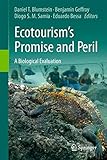Ecotourism's Promise and Peril : A Biological Evaluation / [edited by] Daniel T. Blumstein, Benjamin Geffroy, Diogo S. M. Samia, Eduardo Bessa.
Material type: TextPublisher: Cham : Springer International Publishing : Imprint: Springer, 2017Edition: 1st ed. 2017Description: 1 online resource (XV, 185 pages 44 illustrations, 40 illustrations in color.)Content type:
TextPublisher: Cham : Springer International Publishing : Imprint: Springer, 2017Edition: 1st ed. 2017Description: 1 online resource (XV, 185 pages 44 illustrations, 40 illustrations in color.)Content type: - text
- computer
- online resource
- 9783319583310
- 570 23
| Item type | Current library | Call number | Status | Date due | Barcode | |
|---|---|---|---|---|---|---|
| E-Resources | Main Library E-Resources | 570 Ec19 (Browse shelf(Opens below)) | Available | E002948 |
Browsing Main Library shelves, Shelving location: E-Resources Close shelf browser (Hides shelf browser)

|

|

|

|

|
No cover image available No cover image available |

|
||
| 570 Al425 Scientific process and social issues in biology education / | 570 C592 Biology / | 570 C594 Biology / | 570 Ec19 Ecotourism's Promise and Peril : A Biological Evaluation / | 570 F788 Concepts of biology / | 570 M746 Concepts of biology. - 1st Canadian Edition | 570 M875 Biology : how life works / |
Introduction: Ecotourism's Promise and Peril -- Physiological and Behavioral Consequences of Human Visitation -- Ecological Consequences of Ecotourism for Wildlife Populations and Communities -- Transgenerational Consequences of Human Visitation -- Impacts of Fish Tourism -- Impacts of Marine Mammal Tourism -- Impacts of Terrestrial Animal Tourism -- Impacts of Penguin Tourism -- How Ecotourism Affects Human Communities -- Best Practices Towards Sustainable Ecotourism -- Creating a Research-based Agenda to Reduce Ecotourism Impacts on Wildlife.
Intended as a guide for wildlife managers and ecotourism operators, as well as interested ecotourists, this book addresses the biological principles governing how ecotourism affects wildlife. The introductory chapters focus on four key responses to human visitation-behavioral, physiological, ecological, and evolutionary. Readers will discover ecotourism's effects on biodiversity in connection with various industries that are habitat or taxonomically specific: fish tourism (including both freshwater and marine), marine mammal tourism, the huge industry centered on terrestrial animals, and the well-studied industry of penguin tourism. Given that the costs and benefits of ecotourism cannot be meaningfully assessed without understanding the human context, particular attention is given to how ecotourism has been used as part of community development. In closing, the book synthesizes the current state of knowledge regarding best practices for reducing human impacts on wildlife. The final chapter highlights key research questions that must be addressed to provide more evidence-based guidelines and policy.
Description based on publisher-supplied MARC data.
There are no comments on this title.

